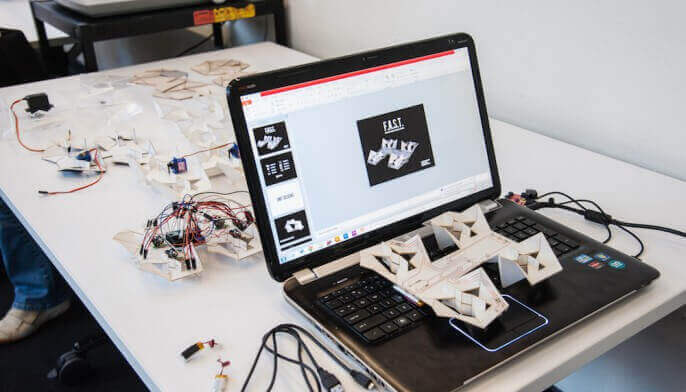popupCAD is a free suite of tools to help designers and engineers make flat-packed devices, like 3D printed crawling robots.
A team of top robotics researchers from Harvard University believe that this origami style of robot design – a strange hybrid of flat-pack furniture and pop-up storybook – will be a key development in robotics.
In 2014, Rob Wood and his team at the Microrobotics lab at Harvard University developed designs for tiny robots that are quick and cheap to make. And for the next stage, they’re sharing the tools necessary to build such machines in classrooms all over the world.
Anyone with a little programming know-how should be able to use the new and free software tool, called popupCAD.
The tool allows beginners to model a pattern for a robot that can be folded into shape using origami principles, which can then “scuttle” or move accordingly.
The model is then printed, milled or laser-cut onto plastic or paper, and electronic components are overlaid on top to create a brilliant little robot.
popupCAD simplifies robot design
The benefit of 3D printing a flat-packed robot is that the building process is simplified and accelerated.
Daniel Aukes, a post doctoral researcher at the lab, spent two years developing popupCAD. As he explains to Beta Boston: “What this is, is just an easy way to make very cool robots.”
The hope is that, as 3D printers are already in use in many schools and libraries, the software will tempt students into learning how to code. By using the fundamentals of origami to put their creations into motion, these cool little robots can march over all obstacles to higher learning.
Until the end of the 2015, Aukes is running a Pop-up Design Challenge for the best designs that use popupCAD to develop robots.
Whether you are a student, designer or engineer, all are welcome to apply. Groups can apply for a grant to fund the 3-D printing of their models. The winning prize is $2,500 and two others will be awarded second and third prizes of $1,500 and $1,000 each.
License: The text of "Teach Kids to Code with popupCAD and Flat-packed Robots" by All3DP is licensed under a Creative Commons Attribution 4.0 International License.
